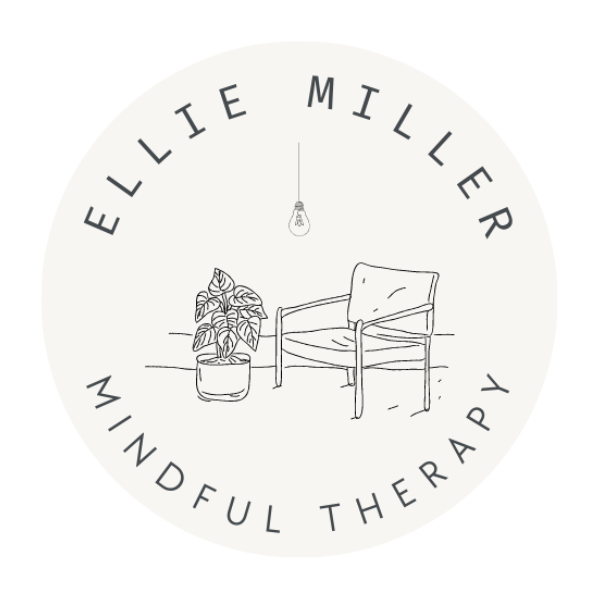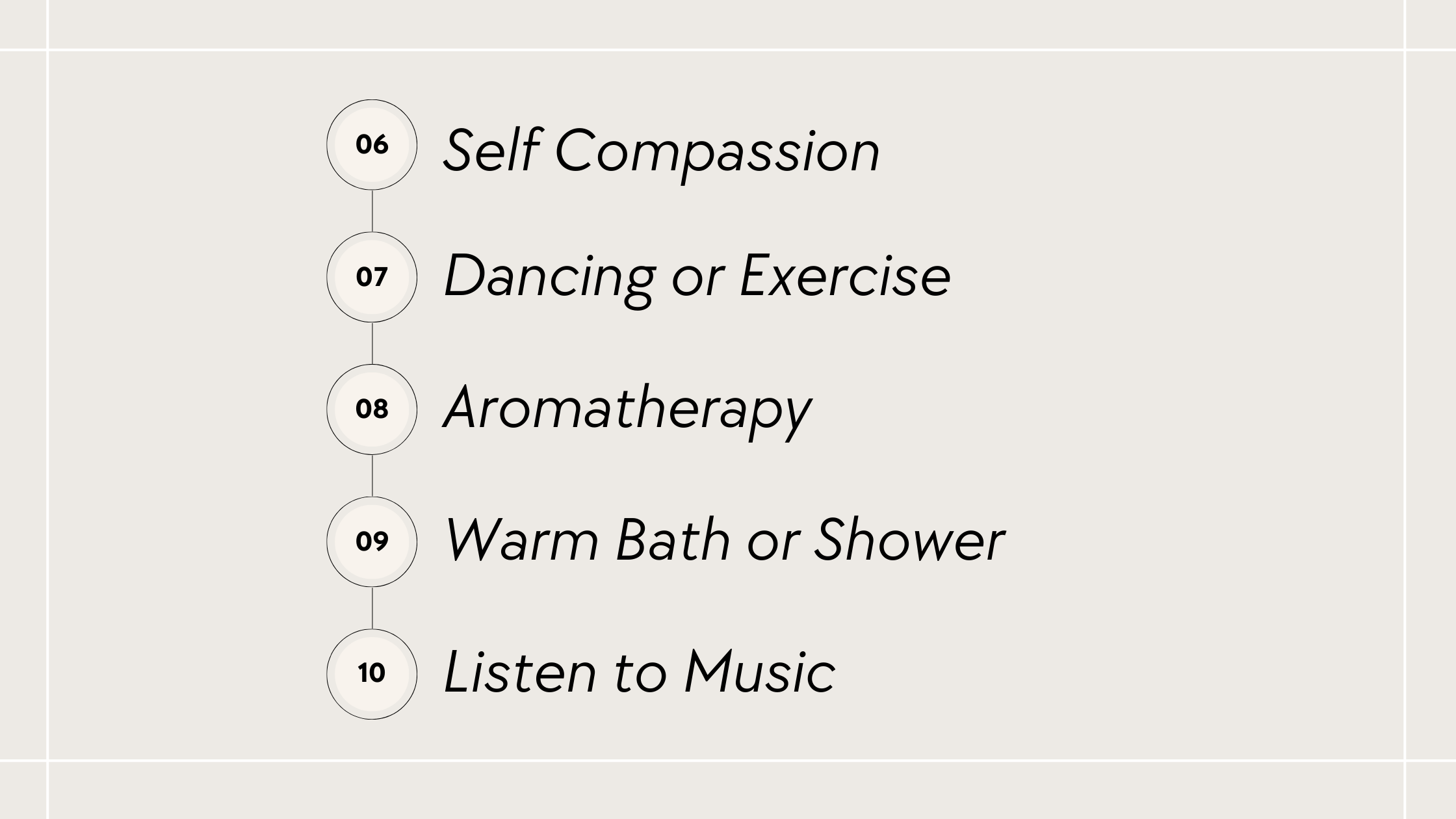20 Proven Techniques for Soothing Your Nervous System and Managing Anxiety
I know you're familiar with that burnt out, stressed, “I’M SO OVER THIS” feeling. What usually brings it on for you? Busyness? Conflict? New things?
Do you ever feel like you're left with a restless mind and anxious energy after pushing through a hard thing? Well have I got the thing for you.
In walks self soothing strategies.
Tell Me More About Soothing My Nervous System
When you're feeling anxious or stressed, your nervous system can get stuck in a state of high alert, causing your body to feel tense and your mind to race.
Soothing your nervous system involves using different techniques to help your body and mind switch out of this state and into a more relaxed and calm state.
Ready to up the relaxation and ease anxiety, stress, and overwhelm?
Understanding Your Nervous System: How Anxiety Affects It and Why Soothing Resets Can Help.
Our nervous system is kind of like the control center for our body. It's responsible for all kinds of things, like regulating our heartbeat, breathing, and digestion, and sending messages between our brain and the rest of our body.
When we feel anxious or stressed, our nervous system goes into overdrive. You’ve probably heard of the "fight or flight" response, which is basically a natural survival mechanism that's designed to keep us safe from perceived threats.
But when we're constantly in this state of high alert, it can take a toll on our physical and mental health.
That's where nervous system soothing come in.
By practicing techniques that promote relaxation and activate the "rest and digest" response, we can help our nervous system balance out and reduce feelings of anxiety and stress.
It's kind of like hitting the reset button on your body and mind.
So if you're feeling anxious or overwhelmed, don't worry - you're not alone, and there are things you can do to help yourself feel better.
Give some of these nervous system soothing techniques a try and see what works for you!
Ready to Reset
20 Strategies for Soothing Your Nervous System & Easing Anxiety
Deep breathing
Find a quiet and comfortable place to sit or lie down.
Inhale deeply through your nose, feeling your belly expand. Hold the breath for a few seconds, then exhale slowly through your mouth, feeling your body relax.
Repeat this for a few minutes, focusing on the sensation of the breath.
Or go ahead and check out this article with 10 breathing exercises to try. See which one floats your boat!
2. Progressive muscle relaxation
Start at the top of your body, with your forehead, and tense the muscles in that area for a few seconds, then release.
Move down to your jaw, shoulders, chest, arms, hands, stomach, butt, thighs, calves, and feet, tensing and releasing each muscle group.
As you do this, focus on the sensation of tension and relaxation in each area.
3. Mindfulness meditation
Find a quiet and comfortable place to sit or lie down. Close your eyes and focus on your breath, noticing the sensation of the air moving in and out of your body.
If your mind wanders, gently bring your attention back to your breath. You can also focus on the sensations in your body or the sounds around you, without judging or analyzing them. Check this out for info on how to start a meditation practice.
4. Yoga
Yoga combines physical movement with mindfulness and deep breathing, making it a great way to reset your nervous system.
Find a quiet and comfortable place to practice. You can follow a yoga video or class, or create your own sequence.
Move slowly and mindfully, focusing on your breath and the sensations in your body. Pay attention to any areas of tension or discomfort and adjust your movements accordingly.
My favorite youtube yoga teach is Yoga With Adriene, highly recommend!
5. Visualization
Find a quiet and comfortable place to sit or lie down. Close your eyes and imagine yourself in a peaceful and calming place, such as a beach or forest, or somewhere that feels uniquely special to you.
Visualize yourself relaxing and letting go of stress and tension. You can also use guided imagery or visualization exercises.
6. Practice self-compassion
When we're stressed or anxious, our bodies can go into overdrive, producing hormones like cortisol and adrenaline that can leave us feeling tense and on edge.
But by showing ourselves some kindness and understanding, we can help promote feelings of calm and relaxation.
Whether it's some compassionate self talk, taking a few deep breaths, or indulging in a little self-care, you'll be doing your nervous system a favor.
7. Dancing or exercise
Choose an activity that you enjoy, such as dancing, jogging, or swimming. Or put on your favorite tunes, move your body rhythmically and mindfully, focusing on the sensations in your body.
8. Aromatherapy
Use essential oils, such as lavender or chamomile, to promote relaxation. You can add a few drops to a diffuser or humidifier, or apply them directly to your skin or clothing. Inhale deeply and enjoy the scent.
9. Warm bath or shower
Fill a bathtub with warm water or take a warm shower. Add bath salts, essential oils, or bubbles if desired. Relax in the warm water, feeling the tension and stress melt away.
10. Listening to music
Choose calming and soothing music, such as classical, nature sounds, or meditation music. Put on headphones or play the music softly in the background.
Close your eyes and focus on the sound, allowing it to relax you.
11. Creative expression
Engage in a creative activity that you enjoy, such as painting, drawing, writing, or playing music.
Allow yourself to express your emotions and feelings through the art, without judging or analyzing it.
12. Mindful walking
Take a slow and deliberate walk, focusing on the sensation of your feet on the ground. Pay attention to your breath and the sensations in your body.
Notice your surroundings, without judging or analyzing them.
13. Hugging
Find someone you feel comfortable hugging, such as a friend, family member, or pet. Embrace them tightly, feeling the physical connection and comfort.
When we hug someone, our bodies release endorphins, which are natural painkillers that can help reduce stress and anxiety.
Hugging can also lower levels of cortisol, which is a hormone that's released in response to stress.
14. Practicing gratitude
Practicing gratitude: Focusing on the positive aspects of your life, no matter how small, can help shift your mindset and reduce feelings of anxiety and stress.
One way to practice gratitude is to start a gratitude journal where you write down three things you are thankful for each day. These can be as simple as the sun shining, a cup of coffee, or a kind word from a friend.
Another way to practice gratitude is to express your appreciation to others, whether it's a verbal thank you or a thoughtful note.
By focusing on the good things in your life, you can train your brain to notice and appreciate the positives, which can help you feel more content and less stressed.
15. Spending time in nature
Being outside and connecting with the natural world can be a calming and grounding experience. Research has shown that spending time in nature can lower cortisol levels and reduce feelings of anxiety and depression.
You don't have to go on a long hike or go camping to experience the benefits of nature. Simply taking a walk in a local park or sitting outside in your backyard can be enough to feel more connected to the natural world.
If you're feeling adventurous, you might try exploring a new hiking trail or visiting a nearby beach or forest.
16. Self-massage
Mindful self-massage with hand lotion can be a simple and effective way to release tension and relax your body.
Choose a hand lotion with a scent that you find calming or invigorating, and take a few moments to focus on your breath as you apply the lotion to different areas of your body.
As you massage each area, pay attention to the sensations in your body and let go of any thoughts or worries. You may find that this simple practice helps you feel more centered and at ease.
17. Laughing
Watching a funny video, reading a silly book, or spending time with friends who make you laugh can all help release tension and promote relaxation.
Laughter has been shown to reduce stress hormones and increase endorphins, which can improve your mood and help you feel more relaxed.
18. EFT tapping
This technique involves tapping on specific points on your body while saying positive affirmations. EFT (Emotional Freedom Technique) tapping can help release emotional blocks and promote relaxation.
To practice EFT tapping, start by identifying a negative emotion or thought that you're feeling. Then, tap on specific points on your body, such as the side of your hand, eyebrow, or collarbone, while repeating a positive affirmation related to the emotion you want to release.
For example, if you're feeling anxious, you might tap on the side of your hand while repeating the affirmation "Even though I feel anxious, I deeply and completely accept myself."
19. Mindful eating
Taking the time to savor your food and pay attention to the sensations in your body can be a grounding and relaxing experience.
Mindful eating involves paying close attention to the colors, textures, and flavors of your food, as well as the physical sensations in your body as you eat.
To practice mindful eating, start by taking a few deep breaths and focusing your attention on the food in front of you. As you eat, pay attention to the flavors and textures in your mouth, and notice the sensations in your body as you chew and swallow.
Mindful eating can help you feel more connected to your body and can promote relaxation by slowing down the pace of your day.
20. Grounding techniques
Grounding techniques involve focusing your attention on your surroundings to help you feel more present and less anxious.
For example, you might focus on the feeling of your feet on the ground, the sounds and smells around you, or the temperature of the air.
You can practice grounding techniques anytime, anywhere, and they can help you feel more centered and relaxed.
Some common grounding techniques include deep breathing, counting objects in your environment, or saying a mantra or affirmation to yourself.
Nervous System Resets Are More Effective Than Trying to Get Rid of Anxiety.
Trying to avoid or get rid of anxiety is a natural instinct for many people, but it can be counterproductive in the long run.
The more you try to suppress or push away anxious thoughts and feelings, the more they tend to persist and even intensify. This is because anxiety is a natural response to stress and trying to suppress it can make your nervous system even more dysregulated.
On the other hand, a nervous system reset approach acknowledges the existence of anxiety and works with it, rather than against it.
Instead of trying to get rid of anxious thoughts and feelings, you focus on regulating your nervous system and making room for feelings.
This can help you reduce the impact of anxiety on your life.
By engaging in a nervous system reset, you are taking an active approach to managing your anxiety and stress levels.
It can also help you develop a sense of resilience as you learn to cope with anxious thoughts and feelings in a healthy and constructive way.
Try It Out!
These are just a few techniques you can try for resetting your nervous system. The important thing is to find what works best for you.
Try out different techniques and see what helps you feel more calm and relaxed.
Remember, soothing your nervous system isn't a magic cure for anxiety, but it can be a helpful tool in managing it.
Sources
Harvard Health Publishing: "Relaxation techniques: Breath control helps quell errant stress response" - https://www.health.harvard.edu/mind-and-mood/relaxation-techniques-breath-control-helps-quell-errant-stress-response
Mayo Clinic: "Progressive muscle relaxation" - https://www.mayoclinic.org/healthy-lifestyle/stress-management/in-depth/progressive-muscle-relaxation/art-20045741
National Center for Complementary and Integrative Health: "Meditation: In Depth" - https://www.nccih.nih.gov/health/meditation-in-depth
Anxiety and Depression Association of America: "Yoga for Anxiety and Depression" - https://adaa.org/understanding-anxiety/related-illnesses/other-related-conditions/stress/yoga-stress-relief
Healthline: "10 Aromatherapy Scents and What They Can Do for You" - https://www.healthline.com/health/what-is-aromatherapy
Hi There! I’m Ellie,
A private practice therapist offering online therapy to empathetic women & couples in Baltimore Maryland. I help women manage anxiety & stress and couples strengthen their relationships.
If you live in Baltimore or anywhere in Maryland, reach out to see if we’re a good fit for therapy.











